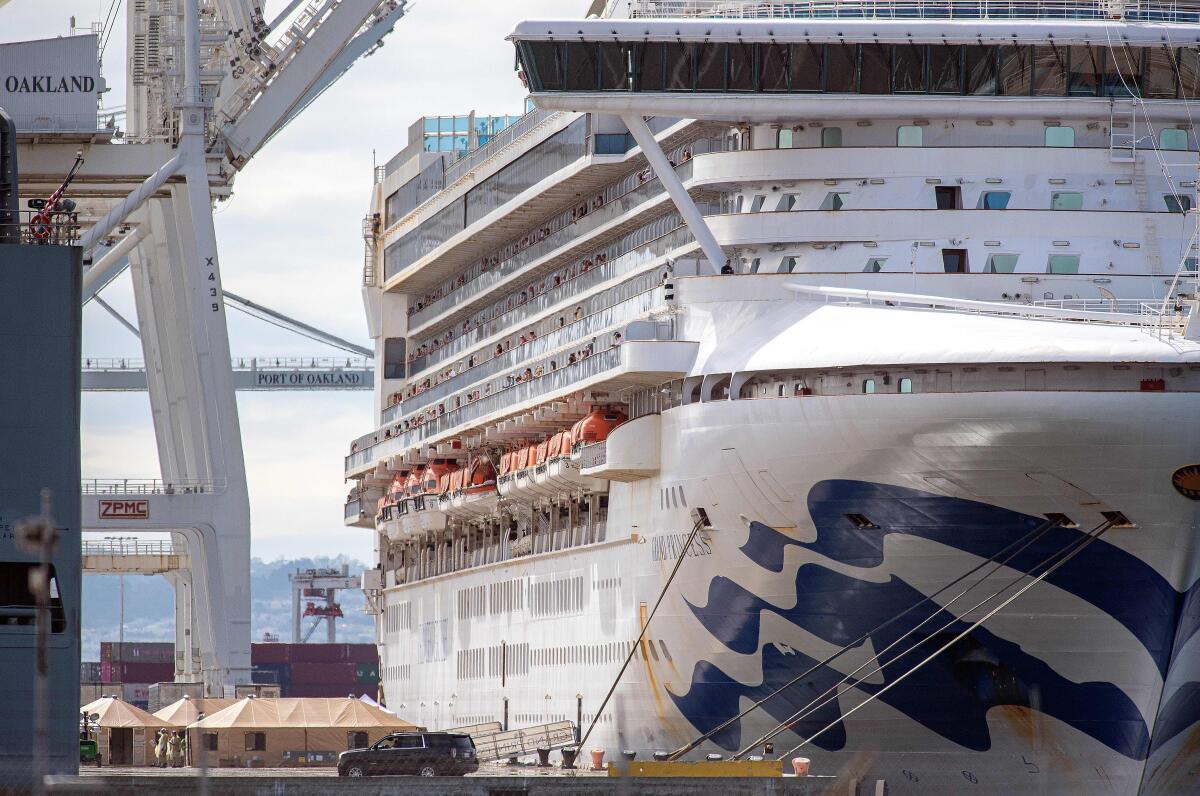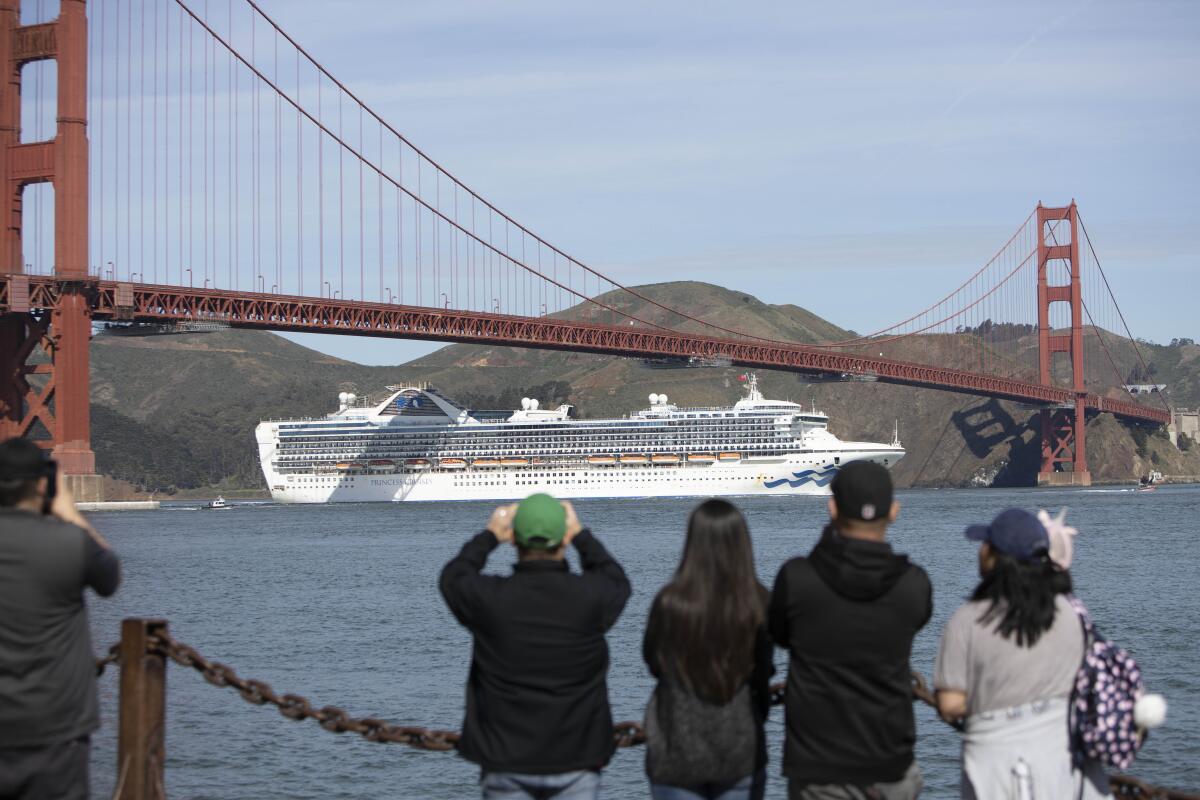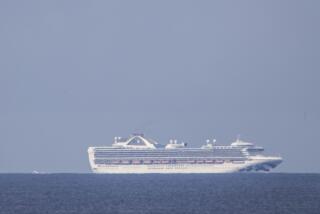This cruise ship had an infamous coronavirus outbreak. Now, it’s set to sail again

- Share via
The cruise ship that stranded thousands of passengers for days off the California coast in one of the nation’s first cruise ship coronavirus outbreaks returns to sea Saturday for the first time in 18 months.
The Grand Princess will depart from the Port of Los Angeles for a five-day cruise to Cabo San Lucas, Mexico, part of a phased effort by the nation’s cruise companies to relaunch the badly battered $150-billion industry after a historic shutdown.
Among the changes enabling its launch: only vaccinated passengers and staff are allowed onboard, masks are mandatory in common areas, and many cabins will have new air-filtering technology.
“Given what happened last year, it’s very important for [the cruise company] that the passengers and crew are safe,” said Lara Handler, who is taking the cruise Saturday with her husband, Blake, to celebrate their 30th wedding anniversary. Before the pandemic, the couple booked cruises almost once a year.
“They are doing what they have to do to make it so,” she said. “I feel pretty confident.”
The 949-foot ship idled off the coast of San Francisco for several days in early March 2020 as public health officials and the cruise company deliberated over how to address an onboard coronavirus outbreak. At least 21 people on the ship tested positive for COVID-19. A week earlier, a 75-year-old passenger from a previous Grand Princess cruise had become California’s first COVID-19 fatality, marking a major turning point in the state’s battle with the coronavirus.
Some cruises have been sailing off Europe and Asia for months, and ships began launching in the U.S. this summer from Texas, Seattle and Florida.
The Carnival Panorama, departing on weekly voyages from the Port of Long Beach to Mexico, relaunched Aug. 21 — the first cruise to embark from Southern California. The Port of San Diego is scheduled to reopen for cruises Oct. 1.
As part of the new health protocols on the Grand Princess, all passengers will be required to show proof of a full COVID-19 vaccination before boarding and proof of a negative viral test, taken within two days of their departure date. The crew will be vaccinated, and the first few cruises will be limited to no more than 75% of the ship’s 2,600-person capacity.

Passengers will be required to wear masks in places such as elevators, retail stores, the casino and before being seated in the main dining room and the buffet area.
The ship’s heating, ventilation and air conditioning system has been upgraded with filters designed to remove fine particles and bacteria, and some units will include ultraviolet light treatment systems to kill viruses in recirculated air, according to Princess Cruises.
Most major cruise lines — including Carnival, Norwegian and Royal Caribbean — require passengers and crew on nearly every cruise from U.S. ports to be vaccinated or to show proof of a negative COVID-19 test.
The Centers for Disease Control and Prevention recommends that unvaccinated people avoid cruise travel. “The virus that causes COVID-19 spreads easily between people in close quarters aboard ships, and the chance of getting COVID-19 on cruise ships is high,” the agency says on its website.
The extended shutdown of operations nearly capsized the industry. Carnival Corp., the world’s largest cruise company and parent company to Princess Cruises, reported losing more than $14 billion since the pandemic started. Royal Caribbean, one of Carnival’s largest competitors, lost more than $8 billion during the pandemic shutdown, the company said.
A survey by New York University’s School of Professional Studies found that only 10% of the more than 2,300 Americans surveyed planned to take a cruise this year, down from 36% in 2019.
Still, cruise companies say reservations are on the rise because of pent-up demand by cruise enthusiasts who have been away for more than a year.
Carnival reported during its latest earnings report Friday that booking volume slowed last month because of an increase in coronavirus Delta variant cases, but cruise bookings for the second half of 2022 have already surpassed the rates of 2019.
“The broader environment for travel, while choppy, has improved dramatically since last summer, and we believe it should improve even further by next summer, if the current trend of vaccine rollouts and advancements in therapies continues,” said Carnival’s chief executive, Arnold Donald. “We have also opened bookings for further-out cruises in 2023, with unprecedented early demand.”
Royal Caribbean said in its April-to-June earnings report that the company received about 50% more new bookings compared with the previous three-month period “with trends improving from one month to the next.” By June, the company said bookings were up 90% compared with the first quarter of the year.
Bookings on Norwegian Cruise Line for 2022 are expected to surpass booking levels for 2019, the company said last month.
But the industry’s problems aren’t over.
The Carnival Vista, sailing from Galveston, Texas, reported a COVID-19 outbreak last month of 26 crew members and one passenger. A 77-year-old passenger who complained of COVID-19 symptoms on the ship later died after being evacuated to a hospital.
Carnival, Princess and other cruise companies also face a wave of lawsuits filed by the families of passengers who have died on cruises and passengers who were stricken by COVID-19 while on a ship.
But such lawsuits are not likely to win huge awards for passengers or their families partly because the cruise companies operate under maritime law, which limits damages from deaths, illness and injuries that take place at sea, said James Walker, a Miami attorney whose firm has filed several lawsuits against cruise ships during the pandemic.
“The lawsuit payouts by cruise lines are, in my view, an insignificant cost in their business model,” he said.
More to Read
Inside the business of entertainment
The Wide Shot brings you news, analysis and insights on everything from streaming wars to production — and what it all means for the future.
You may occasionally receive promotional content from the Los Angeles Times.











